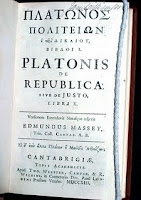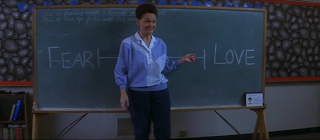"The function of vice is to keep virtue within reasonable bounds."
 i concur, good sir! Plato claimed the soul is like a chariot (reason) pulled by two horses: spirit, and appetite. spirit is easier to control than appetite, so we must develop our reason in order to better control our 'horses,' and not lead a life where debauchery outweighs integrity.
i concur, good sir! Plato claimed the soul is like a chariot (reason) pulled by two horses: spirit, and appetite. spirit is easier to control than appetite, so we must develop our reason in order to better control our 'horses,' and not lead a life where debauchery outweighs integrity. and John Keats wrote wrote an ode on indolence (laziness). in this poem, he describes three figures: ambition, love, and poesy (poetry, which Keats sees as his vice). are we sensing a pattern yet? i must warn you that everything below is my own interpretation and i am by no means an authority. the full text of the poem is provided at the end of this post so's you can make your own interpretation.
Keats laments that he cannot have all three, but that in order for one to flourish, the others must retreat. He describes them:
They pass'd, like figures on a marble urn
When shifted round to see the other side;
They came again, as, when the urn once more
Is shifted round, the first seen shades return;i.e., you can't look at all sides of the urn at once; to fully see one figure, it has to be turned so the others are just out of focus. once he recognized 'who' they are, our narrator seems overcome with emotion. he recognizes that he doesn't have love, and that ambition is short-lived, but that his art - poesy - makes him indolent. it is his vice.
however, the way he ends this ode is most interesting to me. some think he's refusing to acknowledge these three ruling forces in his life, or that he's deciding to continue to choose poesy over love and ambition with his final declaration:
Fade softly from my eyes, and be once more
In masque-like figures on the dreary urn;
Farewell! I yet have visions for the night,
And for the day faint visions there is store;
Vanish, ye phantoms, from my idle spright,
Into the clouds, and never more return!i think, though, he's decided they are crude representations of life. they're masque-like on a deary urn. he has visions - inspiration - and that is worth a lot to him. he calls them phantoms, mocking his idleness. he may look idle, but he's filled with his 'vice.'
i choose to reject the 'dualist' thinking that separates spirit from appetite, and love, ambition, and art from one another. it's just not that simple. it's the whole mind over matter, body versus mind mentality that i tend to disregard as naive. these are helpful ways to examine life and oneself, but the lines are much blurrier.
i see his 'ambition' as a representation of work, 'love' as a representation of family, and 'poesy' as art. but these are all intertwined in a life. further, for Keats, his ambition was his poetry, his work. and his friends/family were, granted, second to his work, but all surrounding it, inspiring it, relating to it.
 we all have art in our lives in one way or another. is Keats saying that art is a luxury, to be enjoyed as a vice for those who have time to laze about and sigh and think and feel? and are those people then lacking in ambition and love? i don't see a lot of bums writing poetry.also, i find it interesting that this isnt an ode TO indolence, but ON it. prepositions have all kinds of meaning, you know. he's not singing a pretty song to laziness. he's lamenting ON the topic of it.
we all have art in our lives in one way or another. is Keats saying that art is a luxury, to be enjoyed as a vice for those who have time to laze about and sigh and think and feel? and are those people then lacking in ambition and love? i don't see a lot of bums writing poetry.also, i find it interesting that this isnt an ode TO indolence, but ON it. prepositions have all kinds of meaning, you know. he's not singing a pretty song to laziness. he's lamenting ON the topic of it. ok, enough deep thoughts. anyone know who Jane Campion is? she's rad. i fell in love with her when i saw The Piano. anyone seen the piano? she wrote and directed it. guess what else she wrote and directed? her first in many many years - Bright Star. it's about Keats (oh, there's the connection). Campion rules at invoking emotion and mood with color and placement and all that mise en scene stuff.
i have no idea how historically accurate it is, and i dont really care. kind of like i know Amadeus isn't accurate, but it's still one of my favorite movies. if you liked The Piano, and/or you like Keats, and/or you like period pieces, great art, etc, etc, just see the movie. it's long and slow, plotwise, but if you pay attention, every minute has something to show you.
now, as promised, the complete Ode on Indolence by John Keats:
One morn before me were three figures seen,
With bowed necks, and joined hands, side-faced;
And one behind the other stepp'd serene,
In placid sandals, and in white robes graced:
They pass'd, like figures on a marble urn,
When shifted round to see the other side;
They came again; as when the urn once more
Is shifted round, the first seen shades return;
And they were strange to me, as may betide
With vases, to one deep in Phidian lore.
How is it, shadows, that I knew ye not?
How came ye muffled in so hush a masque?
Was it a silent deep-disguised plot
To steal away, and leave without a task
My idle days? Ripe was the drowsy hour;
The blissful cloud of summer-indolence
Benumb'd my eyes; my pulse grew less and less;
Pain had no sting, and pleasure's wreath no flower.
O, why did ye not melt, and leave my sense
Unhaunted quite of all but - nothingness?
A third time pass'd they by, and, passing, turn'd
Each one the face a moment whiles to me;
Then faded, and to follow them I burn'd
And ached for wings, because I knew the three:
The first was a fair maid, and Love her name;
The second was Ambition, pale of cheek,
And ever watchful with fatigued eye;
The last, whom I love more, the more of blame
Is heap'd upon her, maiden most unmeek, -
I knew to be my demon Poesy.
They faded, and, forsooth! I wanted wings:
O folly! What is Love? and where is it?
And for that poor Ambition - it springs
From a man's little heart's short fever-fit;
For Poesy! - no, - she has not a joy, -
At least for me, - so sweet as drowsy noons,
And evenings steep'd in honied indolence;
O, for an age so shelter'd from annoy,
That I may never know how change the moons,
Or hear the voice of busy common-sense!
A third time came they by: - alas! wherefore?
My sleep had been embroider'd with dim dreams;
My soul had been a lawn besprinkled o'er
With flowers, and stirring shades, and baffled beams:
The morn was clouded, but no shower fell,
Though in her lids hung the sweet tears of May;
The open casement press'd a new-leaved vine,
Let in the budding warmth and throstle's lay;
O shadows! 'twas a time to bid farewell!
Upon your skirts had fallen no tears of mine.
So, ye three ghosts, adieu! Ye cannot raise
My head cool-bedded in the flowery grass;
For I would not be dieted with praise,
A pet-lamb in a sentimental farce!
Fade softly from my eyes, and be once more
In masque-like figures on the dreary urn;
Farewell! I yet have visions for the night,
And for the day faint visions there is store;
Vanish, ye phantoms, from my idle spright,
Into the clouds, and never more return!
Written in 1819




No comments:
Post a Comment